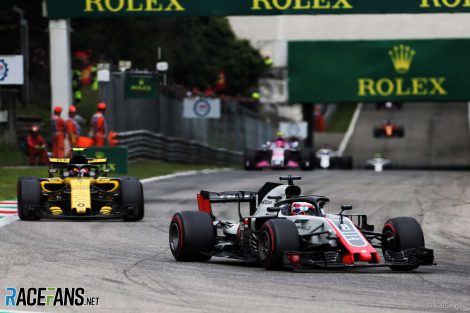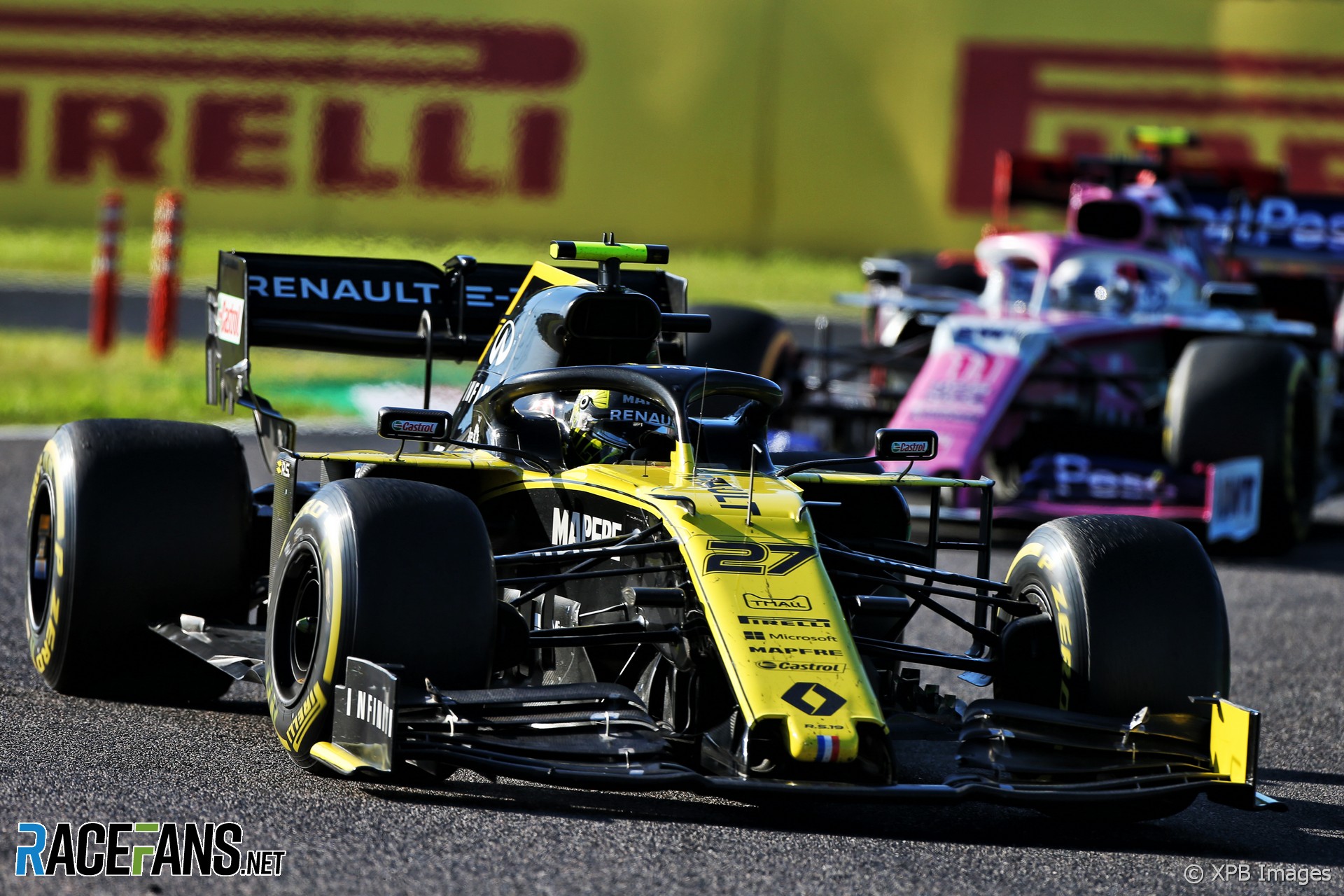The FIA has taken the rare step of disqualifying both Renaults from the last race after ruling its brake bias system functioned as a driver aid.
This is highly unusual to begin with. The last time a team had both its cars disqualified from the same race was in 2011, when Sauber drivers Sergio Perez and Kamui Kobayashi lost their points-scoring finishes in the season-opening Australian Grand Prix when their rear wings failed post-race checks.Renault’s situation is unusual for a couple of reasons. First, because it involved a protest from a rival team.
Last year Renault successfully brought a protest against one of its rivals, Haas, at the Italian Grand Prix. It led to Romain Grosjean being disqualified when his floor was found to be illegal. (The team’s other car might have faced the same protest but Kevin Magnussen was the last car running at the finish so no one had anything to gain from his disqualification.)
At the time Haas accused Renault of breaking with convention by not flagging a potential area of dispute before a race instead of resorting to an acrimonious post-race protest. In that respect, some might argue Renault have reaped what they sowed.

“[Haas] broke the regulations,” said Green at the time. “It was a technical directive from the FIA telling everybody these are the regulations and you need to abide by them by Monza. Plenty of time.
“That’s a completely different scenario from thinking someone’s illegal and then doing a sneaky on them at the end of the race. Which tends not to happen, we tend to talk to the FIA and the FIA will talk to the team and sort it out.”
The other reason Renault’s situation is unusual is that they have been disqualified for breaking the sporting regulations, rather than the technical rules.
Technical infringements almost invariably lead to disqualification as Renault well knows. Just two races earlier Daniel Ricciardo’s RS19 was found to have broken the technical regulations during qualifying and he was thrown out.
The team, and Ricciardo, clearly felt their Singapore punishment was excessive. But FIA race director Michael Masi was clear in his opinion that infringements of the technical regulations, however minor, must lead to disqualification, which is consistently with long-standing precedent.
Advert | Become a RaceFans supporter and
But in this latest case, while Racing Point alleged Renault’s car broke the technical regulations, the stewards ruled they hadn’t, but had actually infringed the sporting regulations. Specifically, article 27.1, a blunt nine-word clause which states: “The driver must drive the car alone and unaided.”

There have been few other such breaches. The most recent example was the 30-second time penalties given to both Alfa Romeo drivers after the German Grand Prix when their clutch performance at the start was deemed to infringe the same rule.
In Renault’s case, the stewards gave a clear sign that they found the nature of their infraction was serious enough to merit a severe penalty: “The relative benefits gained under the breaches of Article 27.1 in those previous cases and the two resulting from this race were specifically assess and the penalty here resulted from that assessment.”
But while disqualification is the “more severe” decision as far as sporting infringements go, it is clearly less severe than disqualification from multiple races. An unanswered question remains how long Renault has had this system on its car.
Go ad-free for just £1 per month
>> Find out more and sign up
Racing Point may have known about the system for some time and chosen not to protest it until they stood to gain a significant haul of points. As the table below shows, in the two races prior to the Japanese Grand Prix, Racing Point stood to gain comparatively little from protesting Renault.
So just when were Renault rumbled?
Consequences of a Renault double disqualification at all races so far in 2019
By successfully protesting Renault in Japan, Racing Point ensured they gained four points while their rivals lost nine – a 13-point swing. Did that influence the timing of their protest?
Here is how the same verdict would have changed the points scored at all of this year’s races.
| Race | Renault loss | Racing Point gain | Total swing |
|---|---|---|---|
| Australia | 6 | 2 | 8 |
| Bahrain | 0 | 0 | 0 |
| China | 6 | 2 | 8 |
| Azerbaijan | 0 | 0 | 0 |
| Spain | 0 | 0 | 0 |
| Monaco | 2 | 0 | 2 |
| Canada | 14 | 5 | 19 |
| France | 4 | 1 | 5 |
| Austria | 0 | 0 | 0 |
| Great Britain | 7 | 0 | 7 |
| Germany | 0 | 0 | 0 |
| Hungary | 0 | 0 | 0 |
| Belgium | 4 | 1 | 5 |
| Italy | 22 | 5 | 27 |
| Singapore | 2 | 0 | 2 |
| Russia | 1 | 1 | 2 |
| Japan | 9 | 4 | 13 |
Advert | Become a RaceFans supporter and
2019 F1 season
- Crying in the Melbourne car park at 2019 grand prix was my career low – Ocon
- McLaren Racing reports reduced £71 million loss in 2019
- Kvyat: Hockenheim podium last year was “my biggest achievement” so far
- How the FIA’s new encrypted fuel flow meter targets Ferrari’s suspected ‘aliasing’ trick
- “He smashed my office door”: 23 must-see moments from ‘Drive to Survive’ season two





Patrick (@anunaki)
24th October 2019, 8:42
They probably can get some information about when Renault started tot use it from watching alle the onboards from 2019
Annette
24th October 2019, 9:37
I suspect from the points gained that RP didn’t know about this or Renault weren’t using it before Singapore. Because if they did they sure as hell would have used it at Monza where they would have gained 27 points as opposed to 13.
AllstarGP
24th October 2019, 11:39
Can this sort of thing be seen in the data? If so, wouldn’t that mean that the team should be punished for all the races in which this is used?
DB-C90 (@dbradock)
24th October 2019, 12:49
What I’d like to see now is for the FIA to examine all, or at least random cars braking systems. I suspect Renault wouldn’t be the only team using the system.
JohnH (@johnrkh)
24th October 2019, 13:15
@dbradock I think Merc use a similar system but Renault went a step further. I’m happy to be corrected on that.
Carlos Medrano (@carlosmedrano)
24th October 2019, 13:38
The f1 stewards have got to be the most inconsistent stewards in all of sports history
F1oSaurus (@)
24th October 2019, 19:35
@carlosmedrano Especially the group of stewards at work in Suzuka.
Initially
25th October 2019, 6:14
if Ricciardo wasn’t driving for Renault you wouldn’t care about the penalty.
GnosticBrian (@gnosticbrian)
24th October 2019, 13:52
Will the FIA invesyigate the allegations about Ferrari’s engines in this week’s AutoBild?
Adam
25th October 2019, 0:35
No…. its Ferrari they are allowed to break as many rules as they want. Havent you learned that by now.
Brian (@bealzbob)
24th October 2019, 14:49
Completely agreed on why it was more severe in the event that they find them guilty, and their explanation for it. One is a precedent. Everyone else knows from that point onwards. What they did was knowingly sneaky; knowingly cheating.
anon
24th October 2019, 18:56
@bealzbob, I wouldn’t say that it was necessarily “knowingly sneaky; knowingly cheating”, as the ruling from the FIA does actually explicitly state that the system that Renault have developed “does not breach any current Technical Regulation”.
As Dieter notes, the FIA’s ruling makes it clear that the system that Renault have developed fully complies with the Technical Regulations. Even the FIA’s own ruling states there is “a clear distinction between this system and one which provides actual feedback control, which could be a substitute for driver skills or reflexes”, suggesting that it is pretty marginal as to whether this can even be considered an illegal driver aid.
I wouldn’t say that it is therefore “knowingly sneaky” if the FIA itself is saying that the system does in fact fully comply with the Technical Regulations, and it is only on a slightly questionable interpretation of the Sporting Regulations that it falls foul of. In fact, I wonder whether Racing Point might have even lost their protest if they hadn’t invoked that part of the sporting regulations – on a purely technical challenge, they would have lost.
Sergio (@blasbri)
24th October 2019, 15:04
Hi, @keithcollantine , I believe that the last time a team had both their cars disqualified at the same race was the 2019 German Grand Prix, Alfa Romeo Racing.
Hugh (@hugh11)
24th October 2019, 15:46
They both got 30 second penalties I believe, putting them to last and 2nd last in the running order.
Hugh (@hugh11)
24th October 2019, 15:50
So, they hadn’t broken technical regs, but rather sporting regs saying the drivers must drive unaided. I assume that therefore there are sections for driver aids exempt from the rule, eg power steering, clutch systems, etc, all to help the driver? If so, then the penalties are fair enough (although the precedent from Germany suggests maybe it should be 30 sec pens, but hey, same result, 0 points), but if there isn’t that, then what is it that makes those aids acceptable, and auto brake balance systems not? I do think that auto brake balance systems should be illegal, but it would be interesting to see what it says in the regulations about legal driver aids.
Brian (@bealzbob)
24th October 2019, 16:05
The problem here was that a system was making constant (pre-set) adjustments to settings on the fly, on behalf of the driver. Adjustments that the driver could and should make themselves. So it’s not like having a feature on the car like power steering. It was effectively like having an extra pair of hands in the cockpit making adjustments on the steering wheel that you must make yourself.
regs (@regs)
24th October 2019, 16:25
But drivers do not rotate wheels by their own hands. They use a large set of pre-set adjustments in which steering wheel is just a part of it.
benj
24th October 2019, 22:28
By pre set I believe the equivalent for a steering wheel would be they turn any amount right and it knows which corner they are on and moves the wheels the correct amount.